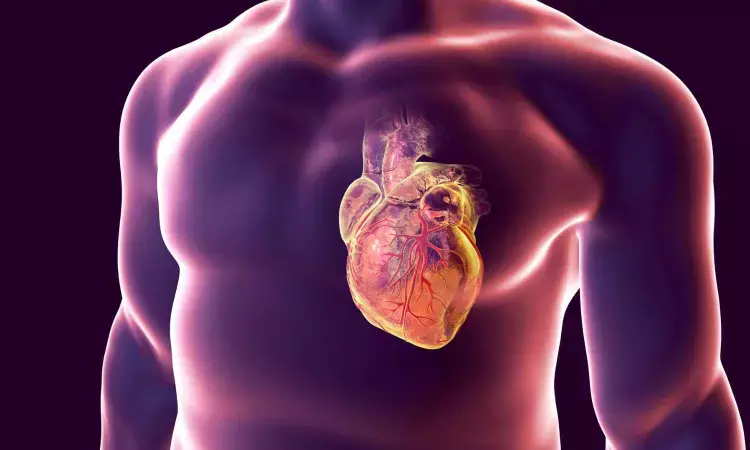- Home
- Medical news & Guidelines
- Anesthesiology
- Cardiology and CTVS
- Critical Care
- Dentistry
- Dermatology
- Diabetes and Endocrinology
- ENT
- Gastroenterology
- Medicine
- Nephrology
- Neurology
- Obstretics-Gynaecology
- Oncology
- Ophthalmology
- Orthopaedics
- Pediatrics-Neonatology
- Psychiatry
- Pulmonology
- Radiology
- Surgery
- Urology
- Laboratory Medicine
- Diet
- Nursing
- Paramedical
- Physiotherapy
- Health news
- Fact Check
- Bone Health Fact Check
- Brain Health Fact Check
- Cancer Related Fact Check
- Child Care Fact Check
- Dental and oral health fact check
- Diabetes and metabolic health fact check
- Diet and Nutrition Fact Check
- Eye and ENT Care Fact Check
- Fitness fact check
- Gut health fact check
- Heart health fact check
- Kidney health fact check
- Medical education fact check
- Men's health fact check
- Respiratory fact check
- Skin and hair care fact check
- Vaccine and Immunization fact check
- Women's health fact check
- AYUSH
- State News
- Andaman and Nicobar Islands
- Andhra Pradesh
- Arunachal Pradesh
- Assam
- Bihar
- Chandigarh
- Chattisgarh
- Dadra and Nagar Haveli
- Daman and Diu
- Delhi
- Goa
- Gujarat
- Haryana
- Himachal Pradesh
- Jammu & Kashmir
- Jharkhand
- Karnataka
- Kerala
- Ladakh
- Lakshadweep
- Madhya Pradesh
- Maharashtra
- Manipur
- Meghalaya
- Mizoram
- Nagaland
- Odisha
- Puducherry
- Punjab
- Rajasthan
- Sikkim
- Tamil Nadu
- Telangana
- Tripura
- Uttar Pradesh
- Uttrakhand
- West Bengal
- Medical Education
- Industry
Catheter ablation in very old patients with nonvalvular AF tied to lower incidence of death, CV events

Japan: In very old nonvalvular AF (NVAF) patients using direct oral anticoagulants (DOACs), those who underwent atrial fibrillation (AF) ablation had a lower incidence of both CV (cardiovascular) events and death than those who received only medical therapy, says a recent study published in Aging.
Catheter ablation of atrial fibrillation (AF) is recommended for selected older patients. However, the preventive effects of AF ablation on cardiovascular events and death remain unclear, especially in older patients.
In this new study, researchers Keisuke Okawa, Satoshi Taya, Takeshi Morimoto, Ryu Tsushima, Yuya Sudo, Ai Sakamoto, Eisuke Saito, Masahiro Sogo, Masatomo Ozaki, and Masahiko Takahashi from Kagawa Prefectural Central Hospital and Hyogo Medical University aimed to investigate the impact of AF ablation on the incidence of cardiovascular events and death in very old nonvalvular AF (NVAF) patients.
“We conducted a prospective cohort study of consecutive patients with NVAF aged ≥80 years and using direct oral anticoagulants (DOACs).”
The researchers defined cardiovascular events as acute heart failure (AHF), strokes and systemic embolisms (SSEs), acute coronary syndrome (ACS), sudden cardiac death (SCD) and cardiovascular death as AHF/SSE/ACS-related death and SCD. They compared the 3-year incidence of cardiovascular events and death between the patients who underwent AF ablation (Ablation group) and those who received medical therapy only (Medication group).
Among the 782 NVAF patients using DOACs, propensity score matching provided 208 patients in each group. The Ablation group had a significantly lower 3-year incidence of cardiovascular events and death than the Medication group: cardiovascular events, 24 (13.2%) vs. 43 (23.3%), log-rank P = 0.009 and hazard ratio (HR) 0.52 (95% confidence interval (CI) 0.32–0.86) and cardiovascular deaths, 5 (3.0%) vs. 15 (7.8%), log-rank P = 0.019 and HR 0.32 (95% CI 0.16–0.88).
“In very old NVAF patients using DOACs, those who underwent AF ablation had a lower incidence of both cardiovascular events and death than those who received medical therapy only.”
Reference:
Keisuke Okawa1 , Satoshi Taya1 , Takeshi Morimoto2 , Ryu Tsushima1 , Yuya Sudo1 , Ai Sakamoto1 , Eisuke Saito1 , Masahiro Sogo1 , Masatomo Ozaki1 , Masahiko Takahashi, Cardiovascular events and death after catheter ablation in very old patients with nonvalvular atrial fibrillation, https://doi.org/10.18632/aging.204952.
Dr Kamal Kant Kohli-MBBS, DTCD- a chest specialist with more than 30 years of practice and a flair for writing clinical articles, Dr Kamal Kant Kohli joined Medical Dialogues as a Chief Editor of Medical News. Besides writing articles, as an editor, he proofreads and verifies all the medical content published on Medical Dialogues including those coming from journals, studies,medical conferences,guidelines etc. Email: drkohli@medicaldialogues.in. Contact no. 011-43720751


